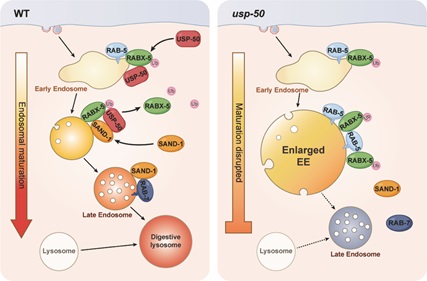
A recent study published in eLife, led by Dr. DING Mei and Dr. HE Kangmin from the Institute of Genetics and Developmental Biology of the Chinese Academy of Sciences, has uncovered a crucial mechanism in cellular material management: endosome maturation.
This process is essential for maintaining cell health and functionality by enabling the sorting, transport, and degradation of materials within cells. It plays a key role in nutrient absorption, immune defense, signal transmission, and waste recycling.
Endosomes act as “sorting stations” inside cells, processing substances like solutes, receptors, lipids, and pathogens. Early endosomes decide which materials should be sent back to the cell surface for reuse and which should be further degraded. Materials marked for degradation are passed to late endosomes and eventually to lysosomes, where they are fully broken down. The transition from early endosomes to late endosomes involves a molecular “handoff,” where the Rab5 protein, marking early endosomes, is replaced by Rab7, marking late endosomes.
However, the precise mechanism behind this critical switch has remained elusive.
Dr. DING’s team investigated the model organism Caenorhabditis elegans and identified a key gene, usp-50, which plays a vital role in regulating endosome maturation. This gene encodes a deubiquitinating enzyme that removes ubiquitin tags from specific proteins, contributing to the Rab5-to-Rab7 transition.
When the usp-50 gene is absent, early endosomes are abnormally enlarged, late endosomes are reduced in number, and digestive lysosome formation is impaired, leading to disrupted cellular material processing.
The researchers further discovered that this mechanism is mirrored in human cells by the protein USP8, which shares similar functions with USP-50.
The study showed that USP8 interacts with Rabex5, a Rab5 activator, and removes ubiquitin tags from it. This de-ubiquitination step causes Rabex5 to detach from early endosomes, paving the way for proteins like SAND-1/Mon1 to activate Rab7, thereby ensuring smooth endosome maturation.
This discovery not only sheds light on the molecular mechanism of endosome maturation but also holds significant medical implications.
Abnormalities in USP8 function have been linked to Cushing’s syndrome and certain cancers, conditions often characterized by overactive or dysfunctional USP8. By understanding USP8’s role in endosome maturation, scientists hope to develop targeted therapies for diseases related to disrupted cellular material management.
"This research deepens our understanding of cell biology and opens new avenues for treating diseases caused by errors in cellular waste management," said Dr. DING.


86-10-68597521 (day)
86-10-68597289 (night)

86-10-68511095 (day)
86-10-68512458 (night)

cas_en@cas.cn

52 Sanlihe Rd., Xicheng District,
Beijing, China (100864)

